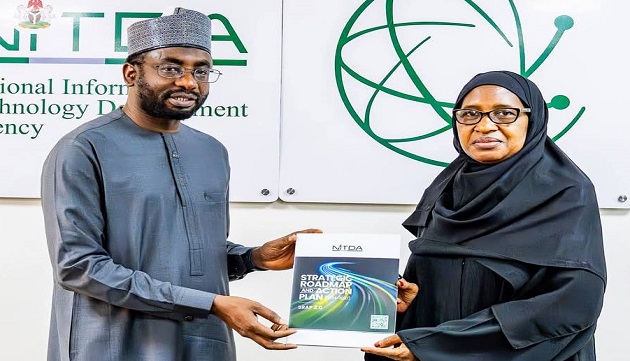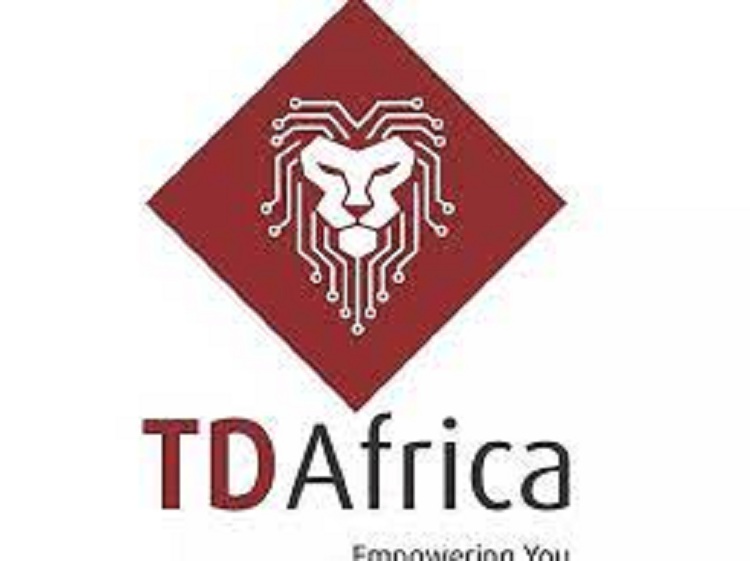General News
DG NITDA Reaffirms Commitment to Research and AI-driven Solutions

The Director General of the National Information Technology Development Agency (NITDA), Kashifu Inuwa CCOE has reaffirmed the agency’s commitment to fostering collaboration among researchers, technology experts, and academics to tackle national challenges through innovation and cutting-edge technology.

Inuwa made this statement during a visit by the management of Nasarawa State University, Keffi (NSUK), led by the Vice Chancellor, Professor Sa’adatu Hassan Liman, to NITDA’s corporate headquarters in Abuja.
He emphasised the importance of stronger collaboration between academics, engineers, and entrepreneurs to address pressing national issues such as environmental sustainability, public health, and infrastructure.
According to him, this aligns with NITDA’s mission to build a robust technology research ecosystem, with a focus on Digital Literacy, Artificial Intelligence (AI), and Research & Development (R&D), and also supports President Bola Ahmed Tinubu’s Renewed Hope Agenda, which prioritises digital transformation and equipping students with future-ready skills.
To institutionalise this partnership, NITDA and NSUK have agreed to develop a Memorandum of Understanding (MoU) to drive impactful initiatives and ensure sustainable, long-term collaboration between the two organisations.
The partnership is expected to accelerate innovation in Nigeria’s tech sector, empower students with digital skills, and contribute to national development through research-driven solutions.
Inuwa further highlighted the transformative potential of Artificial Intelligence (AI) beyond office automation, particularly in healthcare and agriculture, saying “imagine developing a bot that can provide quality health services to our remote areas. One of the challenges we are facing in our healthcare system is the lack of professionals. It’s difficult to get specialist doctors everywhere, but AI can help fill this gap.”
He referenced a recent research study in Nigeria where AI-powered chatbots, such as ChatGPT, were tested against human doctors in providing medical prescriptions. The results showed that AI-generated prescriptions were often comparable to, and in some cases even better than, those provided by human doctors.
“This underscores the potential of AI in telemedicine, offering accessible and efficient healthcare services to underserved communities. Beyond healthcare, NITDA believes AI can drive innovations in agriculture, education, and other critical sectors, reinforcing the agency’s commitment to leveraging technology for national development,” he added.
In her earlier remarks, Professor Sa’adatu Hassan Liman has expressed deep appreciation to NITDA for its continued support in strengthening technology research, digital literacy, and innovation at the institution, while highlighting the significant gains from their collaboration with the agency.
“NSUK has been recognised as a pioneer participant in NITDA’s digital transformation program, a model that the National Universities Commission (NUC) is now working to extend to other universities across Nigeria.
“The university believes the initiative will be a huge success, aligning with its vision of equipping students with digital skills to meet global workforce demands.
“As part of our commitment to advancing technology education, NSUK has established a Digital Literacy Center at the Faculty of Engineering, where students are working on developing tech gadgets to enhance their skills and competitiveness on a global scale.
“Our goal is to ensure that our students are not only well-prepared for Nigeria but also globally competitive wherever they go,” she emphasised.
She further added that collaboration between NITDA and NSUK continues to strengthen Nigeria’s technology and innovation ecosystem, ensuring that students are well-prepared for the digital economy and future workforce.
General News
African Parliamentarians Seek Answers from Telcos on Quality of Service

African legislators across the continent are increasingly demanding answers from mobile network operators for chronic poor service. Parliamentarians in Cameroon, South Africa and Zambia are demanding answers on data pricing, network connectivity needs in rural regions, contributions to job creation, data security and privacy, and adherence to universal service obligations.

Zambia is the latest country to question telcos over quality of service, and National Assembly speaker Nelly Mutti has ordered minister of technology and science Felix Mutati to deliver a ministerial statement on the Airtel network’s repeat outages and the steps being taken to resolve them.
Lawmakers have expressed concerns about the impact of inconsistent connectivity, particularly in rural areas where mobile communication is important for emergencies and essential services.
This come after telecoms regulator, Zambia Information and Communications Technology Authority (ZICTA) read the riot act to Airtel, after its most recent outage last week.
This was not the first time the telco had experienced service interruption, which prompted ZICTA to threaten the telco with a fine.
Meanwhile, the speaker of parliament declared that the nation has to be informed about the causes for the network provider’s bad service and the steps being taken to address the issue.
Mutti said: “This matter is affecting everyone. We need to know why the services are poor and what is being done to ensure service providers comply with stipulated guidelines.”
The move by the Zambian parliament comes a few days after South African parliament also summoned mobile network operators to respond to a range of concerns that lawmakers felt impacted consumers.
The following issues were considered by parliamentarians: network connectivity standards in rural areas, contributions to job creation, transformation, and economic inclusion and empowerment for blacks in general, women, youth, and people with disabilities, data security and privacy, adherence to universal service obligations, and spectrum conditions for universal connectivity.
General News
TD Africa, HP Strengthen Partnership to Advance Africa’s Tech Ecosystem

TD Africa, Sub-Saharan Africa’s foremost technology distributor, took a bold step toward strengthening almost three decades of collaboration by hosting a high-level strategic meeting with HP Inc. at an exclusive gathering in Ikoyi, Lagos.

The meeting brought together top executives from both organisations to reaffirm their commitment to advancing digital transformation and deepening technology penetration across Nigeria and Africa.
Speaking at the meeting, Dr. Leo Stan Ekeh, Chairman of Zinox Group (parent company of TD Africa), traced the long-standing partnership between HP and TD Africa and emphasised the need for a more intentional synergy going forward.
“The relationship between TD Africa and HP goes beyond business; it’s a shared vision to use technology as the catalyst for a smarter, more prosperous Nigeria. Technology is the new oil, and together, we must build the infrastructure to power a 21st-century Africa,” said Dr. Ekeh.
Also, Mrs. Chioma Chimere, Coordinating Managing Director of TD Africa, reaffirmed the company’s commitment to digital inclusion and local empowerment. “At TD Africa, we are passionate about pushing technology to every part of the country and the continent. Our vision is to see an Africa where every individual, business, and institution is IT-ready and globally competitive,” she stated.
On behalf of HP, Kingsley Osuala, Distribution Business Manager, Central Africa, expressed appreciation for the enduring relationship with TD Africa and stressed the importance of local tech adoption.
“We are grateful to TD Africa for staying true to their mission of empowering Africa through technology. As the digital age accelerates, Nigerians must stay ahead by embracing innovation and high-performance tech solutions. That is how we stay globally relevant,” Osuala remarked.
The meeting concluded with renewed resolve from both parties to explore deeper collaboration and build on their shared legacy, one that prioritizes access, innovation, and the digital empowerment of Africa.
General News
Court Orders Lawyer to Produce “Bail-Jumping” Client in MTN Cyber Fraud Case

Justice Ambrose Allagoa of the Federal High Court sitting in Lagos has ordered Mr Nnamdi Kalu, a legal practitioner, to appear before the court on July 9, 2025, to provide explanations regarding the whereabouts of Richard Ironbar Edemadem, his client, who is accused of cyber-related fraud and has allegedly jumped bail.

The judge issued the directive during the ongoing trial of Edemadem and four others, namely: Samuel Okpapi, Nelson Ojovbo, Bamigbade Olushola, and ISD Technology Limited, who are standing trial on charges of tampering with the critical mobile telecommunications infrastructure of MTN Nigeria and illegally profiting from unsolicited messages sent to subscribers.
The prosecution, led by Mr Nnemeka Omewa of the Economic and Financial Crimes Commission (EFCC), informed the court that Edemadem, the first defendant, had jumped bail and ceased communication with both his counsel and the court.
He further revealed that Mr Kalu, who represented the defendant at the early stage of the trial, had stopped appearing in court and was unreachable.
During the trial proceedings, Justice Alagoa queried the continued absence of the first defendant, especially as his name had come up repeatedly during the testimony of the EFCC’s witness.
Upon receiving the explanation from the prosecutor, the judge expressed concern that no attempt had been made to bring the sureties to account, as required when a defendant absconds.
Responding to the judge’s query, Omewa said the prosecution had made efforts to trace the sureties and review the bail bond documents.
However, they discovered that no valid documentation about the sureties or their contact addresses could be found in the court file.
Disturbed by the absence of such critical records, Justice Alagoa directed the absentee defendant’s counsel, Mr Kalu, to appear before the court on the next adjourned date to provide clarity on his client’s disappearance and explain his failure to participate further in the trial.
In the meantime, the trial resumed with the testimony of Mr Olamide Sadiq, the fourth prosecution witness and an investigating officer with the EFCC.
Sadiq detailed how the defendants fraudulently manipulated MTN’s telecom systems to send unsolicited messages to thousands of unsuspecting subscribers.
According to his testimony, the defendants, who were employed as IT professionals for various telecom value-added service providers, compromised MTN’s Critical Mobile Telecommunications Network System between 2017 and 2018, adding that by exploiting the system’s vulnerabilities, they deployed mass unsolicited messages that led to unauthorised deductions from subscribers’ airtime balances.
Sadiq explained that these illegal deductions were routed into multiple accounts linked to the defendants and their affiliated entities, notably ISD Technology Limited.
The stolen proceeds, totalling N36,837,438.20, were subsequently distributed among the conspirators, he said.
Following the witness’s testimony, the court adjourned the matter to July 9, 2025, for the continuation of the trial and to enable Mr Kalu to appear and address the court on the issue of his absconding client.
The EFCC had filed a three-count charge against the defendants, detailing their alleged roles in the multimillion-naira fraud.
On count one of the charges, the defendants, Richard Ironbar Edemadem, Samuel Okpapi, Nelson Ojovbo, Bamigbade Olushola, ISD Technology Limited, and a fugitive known only as “Sola”, were accused of conspiring to tamper with a critical mobile telecommunications network system.
This, the EFCC said, is contrary to Sections 27(6)(b) and 10 of the Cybercrimes (Prohibition, Prevention, etc.) Act, 2015, and punishable under the same law.
The second charge stated that the defendants were charged with unauthorised tampering with MTN’s network infrastructure, an offence also contrary to Section 10 of the Cybercrimes Act, punishable under the same provision.
Counts three of the charges posited that the defendants allegedly took possession of N36,837,438.20, which they reasonably ought to have known were proceeds of an unlawful act, namely, stealing, contrary to Sections 15(2)(d) and (6) of the Money Laundering (Prohibition) Act, 2011 (as amended), and punishable under the same.
Source: Tribune

 News3 days ago
News3 days agoWhy I am vying for AFRINIC board seat in 2025 election – Terry Edet

 Telecom2 days ago
Telecom2 days agoGSMA, Mobile Industry Call for Strengthened Action to Advance Child Online Protection in Africa

 E-Financial3 days ago
E-Financial3 days agoFidelity Bank ED, Kevin Ugwuoke takes over as President of Risk Managers Association

 Telecom3 days ago
Telecom3 days agoCrypto Exchange MEXC Rolls Out P2P Support for Naira, Birr, and Rupee

 News1 day ago
News1 day agoDigital Africa Global Consult, NDPC Partner on Ground-Breaking “Nigeria Data Challenge” Initiative

 General News2 days ago
General News2 days agoTD Africa, HP Strengthen Partnership to Advance Africa’s Tech Ecosystem

 Telecom19 hours ago
Telecom19 hours agoALTON Clarifies on Migration to End-User Billing for USSD Services

 General News3 days ago
General News3 days agoAirtel Concludes Nationwide Environment Week with Market Clean-Up by Employees



























